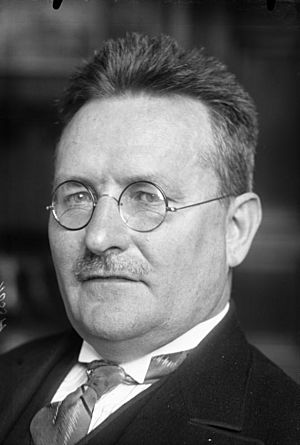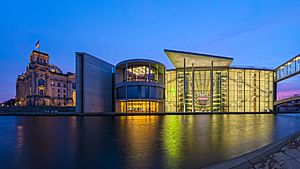Paul Löbe facts for kids
Quick facts for kids
Paul Löbe
|
|
|---|---|

Löbe in 1924
|
|
| President of the Reichstag | |
| In office 7 January 1925 – 30 August 1932 |
|
| Preceded by | Max Wallraf |
| Succeeded by | Hermann Göring |
| In office 25 June 1920 – 28 May 1924 |
|
| Preceded by | Constantin Fehrenbach |
| Succeeded by | Max Wallraf |
| Member of the Reichstag | |
| In office 1920–1933 |
|
| Constituency | Breslau |
| Personal details | |
| Born | 14 December 1875 Liegnitz, Prussia, German Empire |
| Died | 3 August 1967 (aged 91) Bonn, West Germany |
| Political party | Social Democratic Party of Germany (SPD) |
Paul Gustav Emil Löbe (born December 14, 1875 – died August 3, 1967) was an important German politician. He was a member of the Social Democratic Party of Germany (SPD), which is a major political party. Paul Löbe served as a leader in the Reichstag, which was like the parliament or main law-making body of Germany during the Weimar Republic (1918-1933). Later, he also became a member of the Bundestag, the parliament of West Germany after World War II. He passed away in Bonn in 1967.
Contents
Paul Löbe's Early Life and Career
Paul Löbe was the first of four children. His father, Heinrich Löbe, was a carpenter. Paul was born in a town called Liegnitz (now in Poland). Even as a child, he helped his family earn money by delivering newspapers and bread. His father taught him a lot about helping workers.
Paul went to elementary school in Liegnitz from 1882 to 1890. After that, he trained to be a typesetter, which is someone who arranges type for printing. He worked at a newspaper plant from 1890 to 1895. Paul really wanted to be a teacher, but his family didn't have enough money for him to get the training.
Becoming a Writer and Editor
Paul started writing articles very early, between 1891 and 1892. He used a pen name, Alu Pöbel, and wrote for a Social Democratic newspaper. From 1895 to 1898, he traveled and worked in different cities in southern Germany, Austria-Hungary, Italy, and Switzerland.
After his father died in 1898, Paul returned home to help his mother. He worked as a typesetter in Breslau (also now in Poland). In 1899, he became an editor for the newspaper there, and by 1903, he was the editor-in-chief. As an editor, he wrote about problems in society and sometimes criticized the government. This led to him being fined or even sent to prison a few times. For example, in 1906, he spent time in prison for speaking out against a voting system that gave more power to rich people.
Joining Politics
Paul Löbe joined the SPD party in 1895. In 1898, he helped start an SPD group in a town called Ilmenau. By 1899, he was leading the SPD in the Breslau area. In 1904, he was elected to the city government of Breslau.
Paul married Clara Schaller in 1901, and they had one son. He did not fight in World War I because he had a lung disease.
Paul Löbe's Role in the Weimar Republic
From 1904 to 1919, Paul Löbe was part of the Breslau city council. He also served in the Silesian provincial parliament from 1915 to 1920.
Helping Build a New Germany
After World War I, Germany went through a big change called the German Revolution of 1918–1919. Paul Löbe was asked to join the temporary government, but he felt he wasn't ready.
In January 1919, Germany held its first election where both women and men could vote. Paul Löbe was elected to the Weimar National Assembly. This group wrote the Weimar Constitution, which was the new set of rules for Germany. He became a vice president of this assembly in June 1919.
Paul Löbe was a member of the Reichstag from 1920 until 1933. This was the main parliament of the Weimar Republic. He was the president of the Reichstag for many years, from 1920 to 1924 and again from 1925 to 1932. As president, he was in charge of how the Reichstag worked.
In 1925, after the first president of the Weimar Republic died, Paul Löbe was offered the chance to run for president. But he chose to stay in parliament instead. He believed his most important work was there.
Keeping Order in Parliament
As Reichstag president, Paul Löbe often had to deal with noisy and disruptive behavior, especially from the Nazis and the Communist Party. He tried to be patient but also firm to keep order among the members.
Working for Peace and Cooperation
Paul Löbe believed in working with other countries. In 1927, he visited Poland to talk with politicians there. He suggested that Germany and Poland should stop fighting politically and instead work together on trade and business. He wanted them to discuss border issues and make trade agreements. However, Polish nationalists protested his visit, and the Polish leaders didn't agree to his ideas. He later said that Poland was not willing to compromise.
Paul Löbe was also involved in groups that promoted peace and cooperation in Europe, like the Paneuropean Union. He was even president of its German branch for a while. He also joined the Reichsbanner Schwarz-Rot-Gold, an organization that worked to protect democracy in Germany.
Paul Löbe During and After World War II
When Adolf Hitler came to power in 1933, things changed quickly in Germany. Paul Löbe was elected to the SPD party's leadership. He tried to find ways for the SPD to work with Hitler's government, hoping for compromises. However, the SPD was banned by the Nazis on June 22, 1933.
Imprisonment and Resistance
The Nazis arrested Paul Löbe in June 1933. He was held in different prisons and even in a concentration camp called Breslau-Dürrgoy concentration camp, where he was treated very badly. He was released at the end of 1933.
After his release, he worked at a publishing company. Even though he was given a small pension by Hitler's orders, he secretly had connections with a group that was resisting the Nazis. This group included Carl Friedrich Goerdeler. Paul Löbe was arrested again in August 1944 after a failed attempt to assassinate Hitler. He was sent to the Gross-Rosen concentration camp. He was finally freed when World War II ended in the spring of 1945.
Rebuilding Germany
When he was freed, Paul Löbe was in a part of Germany that later became part of Poland. Like many other Germans, he was forced to leave his home. He moved to Berlin in 1945 and immediately started working to rebuild the SPD party.
He strongly disagreed with the idea of forcing the SPD to join with the Communist Party in the Soviet-controlled part of Germany. Because of this, he focused his efforts on the SPD in the western parts of Germany, which remained independent. In 1947, he became the head of the SPD's Foreign Policy Committee.
In 1948 and 1949, Paul Löbe helped write the constitution for West Germany. He was a non-voting member of the group that created this important document.
"Father of the House"
From 1949 to 1953, Paul Löbe was a member of the German Bundestag, the new parliament of West Germany. Because he was from Berlin, he couldn't be directly elected by the people due to rules from the Allied powers. Instead, he was sent to the Bundestag by the West Berlin government.
He was the oldest member of the first German Bundestag, earning him the title "Father of the House". In his first speech to the Bundestag, Paul Löbe asked his fellow Germans to work for a united and free Germany that would be part of a united Europe.
Paul Löbe continued to be active in politics until he died. He especially worked to help German expellees, who were millions of ethnic Germans forced to leave their homes in Eastern Europe after the war.
He also became an editor for a newspaper and helped start another one. In 1949, he became the first president of the European Movement Germany, which works for European unity. He also led a group called Indivisible Germany, which aimed for Germany to be peacefully reunited.
Paul Löbe passed away in Bonn on August 3, 1967. He was given an honorary grave in Berlin.
Honors and Legacy
Paul Löbe received many awards for his important work.
- In 1951, he was given the Grand Cross of the Order of Merit of the Federal Republic of Germany.
- On December 14, 1955, he became an honorary citizen of the city of Berlin.
- He was also an honorary member of the Free University of Berlin.
After Paul Löbe's death, a special ceremony was held in his honor in Berlin. Many important politicians spoke about his contributions.
Today, one of the modern buildings used by the German parliament in Berlin is named the Paul Löbe House, in his memory.
Selected Writings
- Löbe, Paul, Memoirs of a Reich President, Berlin 1949.
- Löbe, Paul, "Contemporary issues of Parliamentarism," in: Pros and Cons. Life Questions of German Politics, Offenbach am Main, 1952, pages 39 to 48.
Images for kids
See also
 In Spanish: Paul Löbe para niños
In Spanish: Paul Löbe para niños
 | Roy Wilkins |
 | John Lewis |
 | Linda Carol Brown |





